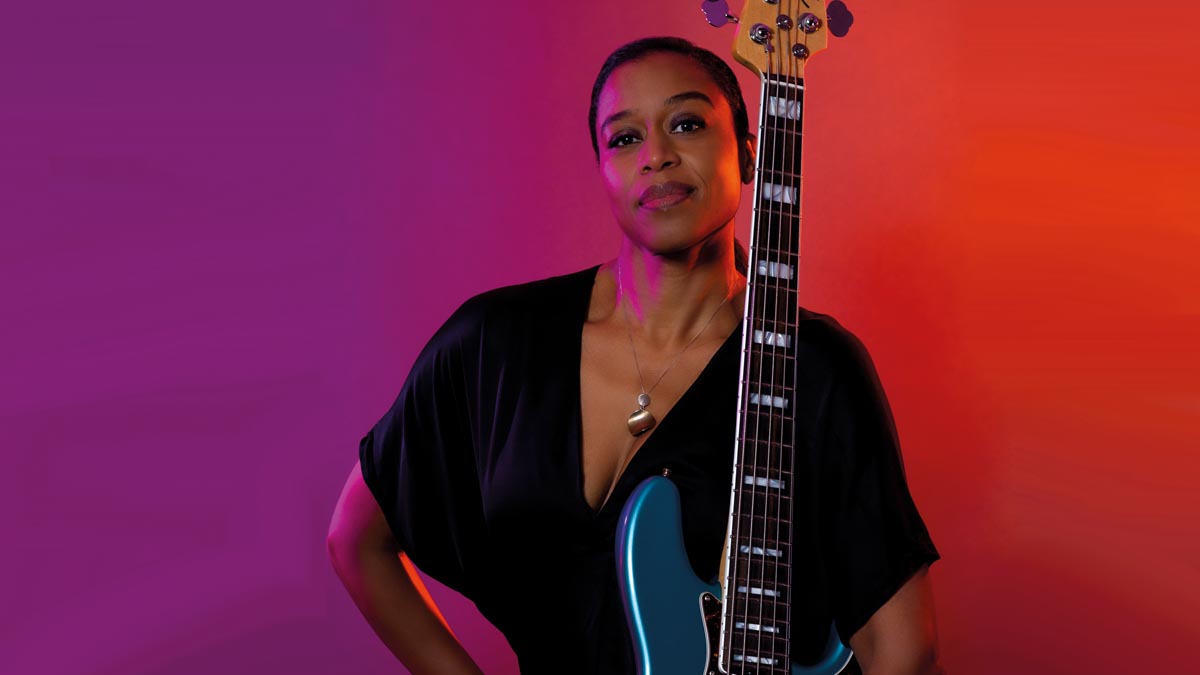Session great Yolanda Charles on her best (and worst) bass albums
Charles reflects on playing with BB King, Paul Weller, Squeeze and P-Funk legend Bernie Worrell

All the latest guitar news, interviews, lessons, reviews, deals and more, direct to your inbox!
You are now subscribed
Your newsletter sign-up was successful
Yolanda Charles has been a professional bassist for close to 30 years, playing with Robbie Williams, Sinead O’Connor, Paul Weller, Dave Stewart, Mick Jagger, Hans Zimmer, Squeeze, and – when the pandemic finally lifts – Sting, amassing a long list of sessions and solo releases along the way.
An endorser of Fender and D’Addario, she is a player of phenomenal ability, whether that means laying down a funk groove or anchoring a rock pocket.
In 2020 she was awarded an MBE in the Queen’s Birthday Honors, of which she explains: “Initially I was a bit confused about why they were giving it to me, because usually they give these out for notable personal success, or if you’re a hero in your community, and I don’t think I quite fit either criterion.
“I looked up what it’s actually for, and it’s about being able to inspire others and set examples. I could understand that, because I don’t really have any peers who are also British, female, and the daughter of Black immigrants, and who have had as long a career in music as I’ve had. I accepted it for that reason.”
Must-have album – The Knowledge (Squeeze, 2017)
“I’m not known for recording whole albums for people, because my focus is on playing live, so I loved the process of working with Squeeze on this one. The way we recorded was pretty old school – I did barely any overdubs. It was all about capturing the moment.
“I love some of the songs, particularly Patchouli and Every Story, which is mostly bass and vocals. The bass has a lot of melodic runs: nothing technical, but just a lot of melody. I don’t usually get a chance to do that on anyone else’s records, so I had quite a lot of scope to be me.
“I would be given a chord chart, and Glenn Tilbrook writes really nice bass parts as well, so I embellished on some of the parts that he came up with. Some of the more unusual movements come from Glenn being a guitarist and hearing the harmony slightly differently.
All the latest guitar news, interviews, lessons, reviews, deals and more, direct to your inbox!
“For that reason, there’s quite a few subs on there – different substituted notes that you might normally not be brave enough to try, because you’d probably expect the songwriter or producer to say ‘What are you doing? Just play the root note.’ But because Glenn came up with some of those basslines, he could put what he was hearing on there, which meant using fifths and thirds, and he substituted root notes that made the parts very interesting to play. I’m really proud of this album.”
Worthy contender – Funk In The Third Quarter (The Deep Mo, 2011)
“The Deep Mo is my own band, and this album was a first for me, because I sang on it, and I’d never sung on a release before. As I was writing and recording it, my marriage broke up, and so it became a bit of a tortured process, with me trying to balance everything while going through a horrendous divorce.
“Still, I learned a huge amount about recording and editing, with a lot of remote sessions sent over to me. I learned how to use Logic through the editing process, and I’m so proud that I did the vocals as well as playing bass. It was a tortuous process, because I’m not really a singer, but I absolutely loved the process of the album coming together and producing it myself.
As I was writing and recording it, my marriage broke up, and so it became a bit of a tortured process, with me trying to balance everything while going through a horrendous divorce
“It turned out to be a real masterclass in how to work with people and how to record them, but also in business terms too. That included learning how to do the artwork, how to physically release the album, and how to get the right distribution, as well as how to write songs and how to arrange them.
“The song I’m most proud of on this record is called The Message. That’s because I’m really proud of the horn parts that I co-wrote for it. The song’s meaning is really important to me as well. I still play that song to this day in my new band, which is called Project PH.”
Cool grooves – Stanley Road (Paul Weller, 1995)
“I played bass on three songs on this album, my favorite of which is You Do Something To Me. I started off using my Blade Levinson bass, but Paul didn’t particularly like the sound of it because it was active, so I changed my rig and I switched to a Fender Precision.
“I wanted something that sounded a bit more like the records that Paul liked, trying to channel that Andy Fraser headspace. It was a really nice 1978 P-Bass and I got a luthier to put in a single-coil pickup by the bridge. He was like, ‘How could you do that to this bass?’ but Fender did the same thing many years later, so I was clearly onto something.
“I couldn’t handle the politics in the band, so I quit before I finished making the record, which was a mistake, I suppose, although I was only 22, so it was basically because of my age. Paul was going through a really difficult time, so he was hard to be around for me at that age, and I didn’t feel like I fit in.
“But I ended up being really proud that I was on it at all, because You Do Something To Me, is a lot of people’s favorite Weller track: I get a lot of pats on the back for being the bass player on that song. So I have to say thank you to Paul for that. I’m really proud of having contributed to this record.”
Wild card – 80 (BB King and Friends, 2005)
“I played on three tracks here – one with Van Morrison featuring Eric Clapton on guitar, and one with Roger Daltrey. I studied the songs carefully, because it was originally Pino Palladino’s session. He was stuck in New York and couldn’t make it to the studio, so I got the session even though I wasn’t really a blues player.
We had a really funny, bizarre moment where BB said ‘Why don’t we ask God to sing this song?’ referring to Eric Clapton
“When I turned up with my 1965 Jazz, I was the youngest person in the room. When I sat down with BB, I suggested that I double his guitar part, because it sounded funky to me that way. He was like, ‘Yeah, yeah, yeah!’ so I went for it. I ended up playing an approximation of his guitar part as the main riff on the bass, which is something I love doing.
“I’m so pleased that BB dug what I played, and I’m very proud that I got a chance to play with him. He’d seen it all: you could see it in his eyes. They were very hard. He had that look, because he was born at a time and in a place when being Black was dangerous. He’d lived through public lynchings. I can’t imagine what it was like to have lived through that segregation.
“We had a really funny, bizarre moment where BB said, ‘Why don’t we ask God to sing this song?’ referring to Eric Clapton, although he ended up singing it himself. I think it was an in-joke that they shared, and it was pretty funny to hear him say that.”
Avoid at all costs – Live Wired Electro (Gota & the Low Dog, 1995)
“Gota Yashiki is the drummer from Simply Red, and I’m putting this album here just because my bass playing isn’t my best on this record.
“The problem is that I don’t feel that I played with much expression: there’s a lot of repetition, and I didn’t have the confidence to step out of my safe places. It’s all a bit naive and a bit underdeveloped.
Bernie Worrell of Parliament-Funkadelic was on the album... he would suddenly pop his dentures out of his mouth, and then make them go back in again, while he was playing his solo
“What kind of music is it? Well, when I play this album to people, they usually say, ‘This is really unusual music’ – and it is, but it was fun to play live. I guess it’s best described as strangely funky, while being a really unusual combination of sounds.
“Although my playing isn’t my best, like I say, I do have a funny story from the live tour. Bernie Worrell of Parliament-Funkadelic was on the album, along with a second keyboard player, and sometimes he’d take a solo.
“Of course, everybody was watching him intently, because he was the legendary guy from P-Funk – and just to make us laugh, he would do this thing where he would suddenly pop his dentures out of his mouth, and then make them go back in again, while he was playing his solo. It probably sounds a bit disgusting, but we would all be standing there and dying with laughter, because it was such a ridiculous thing to witness.”
- You can follow Project PH on Facebook.
Bass Player is the world’s most comprehensive, trusted and insightful bass publication for passionate bassists and active musicians of all ages. Whatever your ability, BP has the interviews, reviews and lessons that will make you a better bass player. We go behind the scenes with bass manufacturers, ask a stellar crew of bass players for their advice, and bring you insights into pretty much every style of bass playing that exists, from reggae to jazz to metal and beyond. The gear we review ranges from the affordable to the upmarket and we maximise the opportunity to evolve our playing with the best teachers on the planet.

